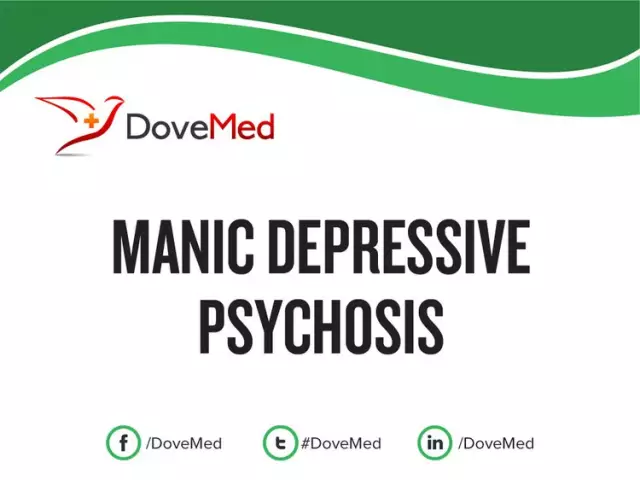- Author Rachel Wainwright wainwright@abchealthonline.com.
- Public 2023-12-15 07:39.
- Last modified 2025-11-02 20:14.
Manic syndrome

A pathological condition in which a person feels an unconditioned increase in mood, mental and ideational excitement in the form of tachypsia, as well as motor excitement, is called manic syndrome. The characteristic signs of the condition, however, not in all cases, are the following manifestations:
- Strengthening instinctive activity - an increase in appetite, sexual desire, self-defense reflex;
- Megalomania;
- Increased distraction.
There are the following types of manic syndrome:
- Manic-paranoid - the patient develops delusional ideas about relationships with the opposite sex, he is able to pursue the object of his passion;
- Oneiric mania - at the peak of the syndrome, a disturbance of consciousness of the oneiric type is manifested, accompanied by hallucinations;
- Delusional variant - megalomania, usually manifested in delusional ideas that have a certain logical sequence concerning the patient's professional activity;
- Joyful mania - in addition to the symptoms of the classic manic syndrome, motor agitation, tachypsychia and hyperthymia are observed;
- Anger mania - usually manifested by a tendency to sudden aggression, irritability, irascibility and conflict with others.
To diagnose manic syndrome, the Altman scale, or the so-called mania test, is used.
Causes of manic syndrome
Often, the condition is a consequence of bipolar affective disorder, it proceeds in paroxysms, with characteristic stages of development and various symptoms, which vary depending on the stage of progression of the disease.
Also, the causes of manic syndrome can be infectious, organic and toxic psychoses, it can be induced by drugs and some drugs, which include:
- Antidepressants;
- Teturam;
- Levopoda;
- Bromides;
- Corticosteroids;
- Psychostimulants;
- Opiates;
- Hallucinogens.
Symptoms of manic syndrome
It can be noted that people with manic syndrome are often in a state of painful mood elevation, combined with unfounded optimism, excessive talkativeness and physical activity. Patients greatly overestimate their capabilities, sometimes their self-esteem reaches megalomania, they tend to take on a lot of things, however, due to increased distraction, they do not finish anything.
Sharpening of memory and speed of thinking are also manifestations of manic syndrome, as well as the desire to constantly establish contacts and expand the circle of friends. Most often, patients commit rash and completely meaningless acts, spend large sums of money on things that a normal person would not think to buy. In many cases, manic syndrome is manifested by an increase in sexuality, and in women, changes in the menstrual cycle (delay or shift) may occur.
At the peak of the state, it is impossible to communicate with such patients, since their conflict, tactlessness and irritability become unbearable. People suffering from manic syndrome do not tolerate comments and objections, they seek to lead any process, and their orders are often completely ridiculous. If the patient feels resistance from the people around him to his plans, he becomes aggressive, is able to start fights and quarrels.
Manic Syndrome: Diagnosis
When diagnosing manic syndrome, a clinical method is used, the main place in which is an objective observation of the patient's behavior and detailed questioning. Based on observation and dialogue with the patient, as well as by studying medical records and conversations with the patient's relatives, the doctor forms a subjective anamnesis and reveals clinical facts that determine the patient's psychological state.
The purpose of diagnosing manic syndrome, in particular, collecting anamnesis, is to obtain reliable data on:
- The presence in the family of relatives with mental illness;
- Mental state;
- Features of development, family and social status, behavior, trauma and reactions to various life situations.
When collecting anamnesis, the doctor should pay special attention to the presence of the following risk factors:
- Stressful changes in life circumstances;
- Family history and history of affective disorders;
- Suicide attempts;
- Drug addiction or alcoholism;
- Chronic somatic diseases.
Additionally, when diagnosing manic syndrome, biochemical and clinical blood tests are performed.
Manic Syndrome: Treatment

After the diagnosis is confirmed, the doctor, depending on the patient's condition, will prescribe either drug treatment or psychotherapeutic conversations. If the patient's condition is accompanied by groundless aggression, irritability, conflict, sleep disturbances - inpatient treatment of manic syndrome is necessary. In such cases, a restriction of the mental and physical activity of the patient is shown, and the appointment of sedatives, antipsychotics or tranquilizers.
Particular attention should be paid to situations in which a person is in an unconditioned state of heightened mood, motor, mental or ciatorial excitement. Especially if such people show delusions of grandeur and persecution, obsessions and increased distraction.
Treatment of manic syndrome can be medication and proceed in a hospital setting, or it can be carried out in the form of psychotherapeutic conversations, the purpose of which is to identify the causes of the development of the disease, as well as to correct the existing manifestations of the syndrome.
YouTube video related to the article:
The information is generalized and provided for informational purposes only. At the first sign of illness, see your doctor. Self-medication is hazardous to health!






